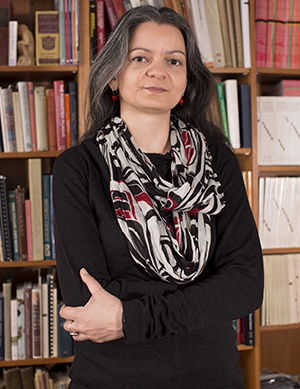Anthropology Department welcomes new faculty members
November 3, 2014
Two new faculty members are taking their knowledge from past experiences to broaden the information students can receive at Kent State.
Evgenia Fotiou, a cultural anthropologist, and Anthony Tosi, a biological anthropologist, are the newest members of the anthropology department.
Fotiou said she began her career in cultural anthropology because of a desire to travel and understand the world.
“I wanted to engage meaningfully with these other cultures, not just be a tourist,” Fotiou said.
As she continued her studies she came to recognize her curiosity in religion and mythology, which lead to her interest in shamanism, Fotiou said.
To learn more about the healing process in shamanism, she traveled to the Peruvian Amazon to study their ceremonies and gain a better understanding of its culture.
During Fotiou’s first trip to the Peruvian Amazon, she said she saw a high amount of westerners interested in these shaman ceremonies. She decided to study why they were coming and what they gained from the ceremonies.
She said she wants to show that we can learn a lot from other cultures, even indigenous ones.
To help show what other cultures have to offer, Fotiou said she is developing classes that encompass the diverse experience she has gained.
While she is at Kent State, Fotiou said she will publish a book co-authored with one of the healers that helped her during her research in the Peruvian Amazon.
Fotiou has also been studying the revitalization of the ancient Greek religion for the past 14 years and how the people of this religion want official recognition.
Tosi began his career in biological anthropology when his undergraduate advisor recommended he take an introduction to human evolution class.
From there, Tosi said it got him hooked on human evolution, which broadened to primate evolution and biological anthropology.
During his post-doctoral work at Kyoto University in Japan, Tosi studied the evolutionary relationship between two types of African-Asian monkeys. Through his studies, he said he found evidence of the possibility of early human interbreeding.
While he was participating in this study, he was also part of a team that discovered a new species of African monkey, which is the first new species of African monkey to be discovered in 30 years.
Before Tosi arrived at Kent State, he gained experience at The New York City Office of Chief Medical Examiner. He said he was a part of a small team that dealt with touch DNA, which deals with amplifying the small amount of DNA that is left on evidence.
“Even though you see it on TV, we were the only lab in the U.S. that does touch DNA work, at least to the extent that we could use it in a court of law,” Tosi said.
Tosi said there are a little more than a dozen people in the U.S. that are trained to perform touch DNA studies, and he is one of them.
While Tosi is in Kent, he said he wants to develop a forensic major in the anthropology department and begin a graduate level exchange program with Kyoto University so students can connect with professionals in the anthropology field.
These new faculty members are studying two of the three subfields the anthropology department has to offer, with the third field being archeology, said Richard Meindl, chair of the anthropology department.
The first reason the new faculty members are so important to the department is because more classes can be offered every semester instead of rotating them every four semesters, Meindl said. The second reason, Meindl said, is the information and experience they bring to share with the Kent community.
“It’s good to have new people,” Meindl said. “But it’s also good to have new people who are very good, and I think I can say that about these two.”
Contact Alyssa Schmitt at [email protected].

























